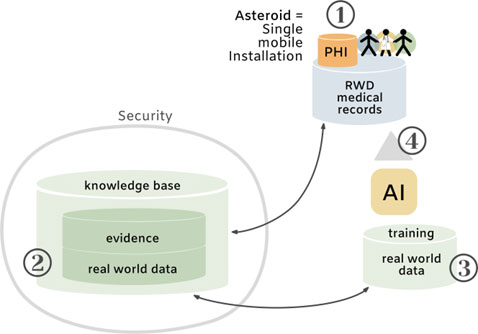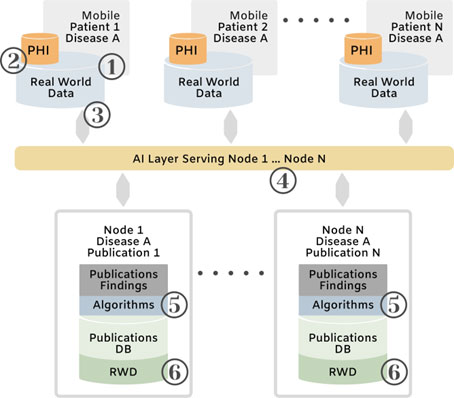2020. The world stands still and the coronavirus pandemic spreads. An infinite amount of health data is produced, but any collection and analysis is difficult. If people and science can access their data anonymously by sharing it – then help can truly be provided. With this idea in mind, Volker Rudolph founded medrepo and started developing an app. It is supposed to collect and analyze real world data with the help of AI.
- LLM based AI
LLM based AI is a kind of text predictor, which is enabled to understand the human language with a kind of quality. LLM is currently used in software for AI. These LLM models will work at the counter or desk of a health facility like a doctors office or hospital.LLM based AI will not work in environments, where complex mathmatical models are used to extract and calculate outcomes. A very simple example is the Body Mass Index (BMI), where you need size and weight (The BMI is defined as the body mass divided by the square of the body height), which means BMI is a nonlinear system. More complex examples are the Mayo Score, DAI and the audio (voice) based detection of diabetes. (Acoustic Analysis and Prediction of Type 2 Diabetes Mellitus Using Smartphone-Recorded Voice Segments) - Real World Data Collection
Real World Data is necessary to prove effectiveness in therapies and the mathmatical models, which are part of medical diagnosis.We will provide a single installation (Asteroid, 1), where the Real World Data collection is linked to a set of medical publications containing dedicated medical diagnosis and data analysis. The single user medrepo Asteroid Mobile App collects RWD (de-identified, anonymized) with disease, medication and other data. The RWD data is stored inside the Medrepo Knowledge Base (2). Training data is selected from the Knowledge Base for the Artificial Intelligence, wich is not LLM based (3). This enables Asteroid users (patients) to receive personalized feedback on their health records (4).

- AI Producers based on LLM
The Training procedure is described with BioMedLM. The following AI producers are available, taken from youtube video Groundbreaking research in health AI | The Check Up ‘23 | Google Health. There is Google MedPALM, GPT Neo, PubMedBERT, BioLinkBERT, DRAGON, Galactica, PubMed GPT, Aleph-Alpha and JohnSnow Labs. - Publications integrated AI based on Algorithms and Models

The patient (Mobile) is collecing Real World Data (RWD) and supplies publications with his RWD for further Diagnostics and Findings (1). The patient keeps his Protected Health Information (PHI) from being transferred to the AI Layer (2). The patient is sharing is de-identified (anonymized) Health Records (Real World Data) as Input for the publications on node 1 to node N (3). The AI Layer is distributing the RWD to the nodes of publications for further Diagnostics and Findings (4). The publications algorithms (translated from the mathematical model) evaluate the RWD (5). As an example take the Mayo Score, DAI. Real World Evidence (RWE) on basis of data can grow inside each Node (Publication) (6). - User Interface for Publications integrated AI

The patient (Mobile Asteroid Installation) is connecting to the Web Server for data Synchronization (1). The patient is selecting the purpose (disease, publications, scientific institutions) which his data has to be used for (2). The health data is synchronized (de-identified, anonymized) without supplying the Protected Health Information (3). The data is stored in a meaningful context and can now be evaluated by mathematical models, which are underlying the medical publications: the Knowledge Base (4). - References
USPTO: US20220116357A1 HIPAA Compliant distributed dataHHS: Guidance Regarding Methods for De-identification of Protected Health Information in Accordance with the Health Insurance Portability and Accountability Act (HIPAA) Privacy RuleFDA: Real-World Evidence
NIH: Examining public views on decentralised health data sharing
Nature medicine: Six ways large language models are changing healthcare


















